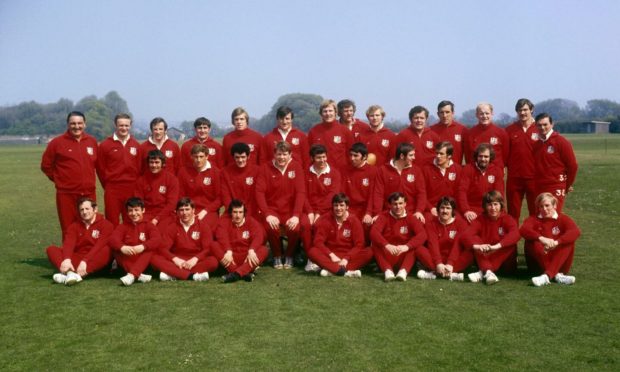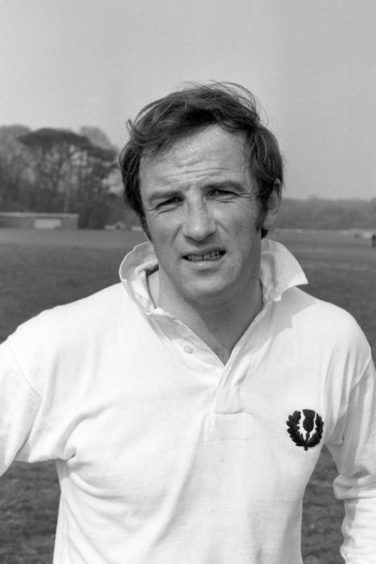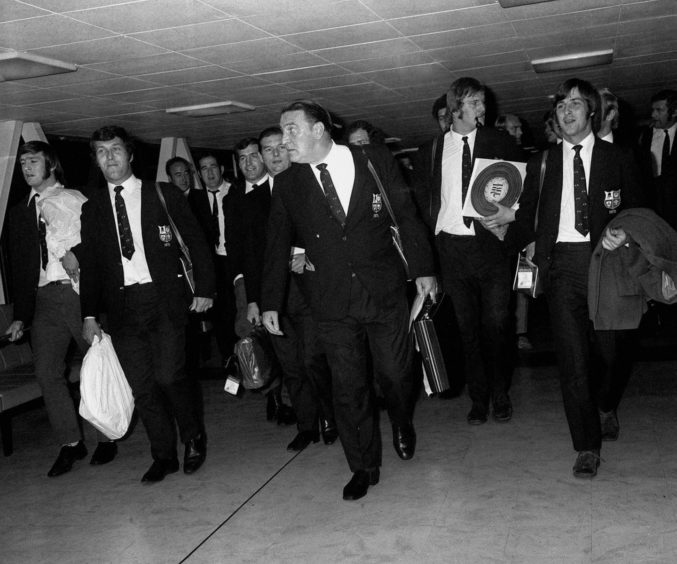It was one of the most astonishing forecasts in sporting history when Doug Smith addressed the media after the 1971 British and Irish Lions squad arrived in New Zealand.
The tour manager, a doctor in Aberdeen, had previously gained eight Scotland caps and, as one of life’s real characters, with a towering physique and mercurial personality, was in no mood to hold back when asked how he thought the series would unfold.
Looking the journalists straight in the eye, he predicted that the Lions would win the four-Test battle 2-1, which seemed all the more improbable because he was asserting that one of the matches would end in a draw.
“We all looked away at that point,” said the captain John Dawes in a subsequent interview. “Nobody wanted to associate themselves with that sort of statement.”
But, remarkably, Smith was absolutely spot-on. And he was one of the figures whose unstinting efforts ensured the Lions defeated the All Blacks for the first time in history.
This was rugby in another time, another age, long before professionalism and the extravagant media hype which now surrounds these quadrennial contests.
While the British and Irish players – including such stellar figures as Barry John, Gareth Edwards, Gordon Brown, Ian McLauchlan, Willie John McBride, Gerald Davies and David Duckham – noticed that their New Zealand counterparts were benefiting from playing – through commercial activities off the field – they themselves received just 75p (or 15 shillings in the period before decimalisation) a day for “expenses” during their prolonged stay in the Land of the Long White Cloud.
Yet, such was the interest in the tour – which had started in Australia in May and didn’t conclude until the historic Fourth Test on August 14 – that the New Zealand public wouldn’t let their guests put their hands in their pockets.
They were fascinated by the presence of Smith, who delivered no less than 26 speeches during the campaign and the Lions coach, Carwyn James, a Welsh nationalist who had stood for Plaid Cymru at the previous year’s general election in Llanelli, as well as being a poet, intellectual and wine-lover with a passion for Chateauneuf du Pape.
But any cultural niceties stopped when the players walked on to the pitch.
The canny James appreciated the value during a 14-week, 26-match tour of the momentum and confidence which was generated by a sustained winning run. Complacency was banished from his plans. Smith, too, oozed positivity.
The warm-up contests might have featured the cream of Kiwi rugby, but although Waikato were expected to provide the Lions with a gruelling challenge, they were swiftly blown away, 35-14. So were Wellington, 47-9, and Otago, 21-9.
These results heightened speculation that the tourists might pose a serious threat when the Tests commenced.
They also provoked a few more unscrupulous individuals into resorting to appalling violence when all else had failed.
A week before the first Test, the New Zealand authorities pitched the Lions against the Ranfurly Shield holders, Canterbury, who were packed with international talent and the stands were packed at Lancaster Park in Christchurch.
But nobody was talking about their positive attributes after one of the most shameful episodes in the rugby chronicles, which became known as the Battle of Canterbury.
Mervyn Davies was among those who sat out the fixture and could barely credit what he was witnessing, as thuggery reigned supreme and the hapless local referee gave up any pretence at trying to officiate amid the incessant mayhem.
He recalled: “I was in the stand watching the most violent game that I had ever seen. We lost our two Test props, Fergus Slattery had his teeth knocked out and the dressing room afterwards was like an accident and emergency unit.
The tactics were cynical and vicious
“We did not have a team doctor then (although Smith was skilled in that department) and therefore we had to rely on the opposition.
“One prop, (Scotland warrior) Sandy Carmichael, suffered a multiple fracture of the cheekbone but stayed on the field until the very end, and the other, Ray McLoughlin, broke his thumb while he was trying to defend himself.
“The referee at one point got the captains together and told them he was going to follow the ball and it was up to them to sort out any trouble.
“The attacks were vicious and it was significant that the match was arranged for the Saturday before the First Test.”
Oh, and the Lions, oblivious to all the intimidation and bampottery from their rivals, won 14-3.
They transcended the ugliness with a unity which showed their mettle.
But there again, it wasn’t as if the Lions themselves were shrinking violets. Ian McLauchlan, for instance, never took a backward step in his career.
And Sean Lynch was one of the toughest hombres in the visiting pack, even if John Dawes later revealed that he also had anxieties about taking to the skies.
He said: “After one session, during which he had a few drinks too many, we were forced to tie him to his bed to get him under control.
“However, the funny thing was that he was scared of flying. The next morning, we were due to travel and Carwyn had actually arranged for him to make the trip by car.
“But, then, Sean said that he wanted to come along and die with the rest of us. And he climbed into the plane, even though he was shaking.”
The Lions realised they were underdogs in the bull-ring of Kiwi rugby (that’s enough animal allusions – Ed), but they possessed a tremendous team spirit, a tactical mastermind behind the scenes in James and a master motivator in Smith.
As McLauchlan, who scored the decisive try in the nerve-shredding 9-3 victory over New Zealand at Carisbrook in Dunedin, said: “Carwyn wasn’t particularly interested in forward play, but he and Doug Smith were perfect psychologists and they led people and got the best out of them, which is 50% of the job.
“You don’t need to know everything about being a prop forward, but you need to be able to pick the right people, which they did, and then get leadership on the field, which they did, and then you have to instil the belief that you can win.
“The results on that tour showed their success.”
The hosts were never going to give up
The tourists were given a stern reminder of the challenge which still confronted them when the All Blacks responded with a 22-12 win in the Second Test in Christchurch, where a brace of scores from Bob Burgess, a penalty try and further touchdowns from Sid Going and Ian Kirkpatrick levelled the series at 1-1.
And there was fresh trouble on and off the pitch in their match against Hawke’s Bay where John Pullin was knocked out by a punch.
He said: “That was a sore one. It was one of their forwards who hadn’t made it into the All Black squad.
“He was a nasty piece of work, so he resorted to violence. I can’t even remember his name now, because that punch was the only impression he made on me.
“It was a dirty game. I recall that things got so out of hand that a woman in the crowd chased Gareth Edwards to hit him with her umbrella – quite heated, you might say.”
Nonetheless, the players and management stuck together and while the home side recalled their former captain, Brian Lochore, while the Lions gave debuts to Gordon Brown and Derek Quinnell, there was a steeliness and derring-do about their performance at Athletic Park in Wellington as they romped to victory.
They rushed out of the blocks, scored two tries, two conversions and a drop goal in the first 20 minutes – all the points coming from Barry John, apart from a Gerald Davies touchdown – for a 13-0 advantage and led by that margin until the interval.
And thereafter, despite a ferocious onslaught in the second half, the All Blacks could only muster one try for Laurie Mains and it finished 13-3.
They couldn’t lay a finger on the King
As Pullin stated: “We hammered them that day. We had seen it coming about eight weeks previously when we thrashed Wellington 47-9 on the same pitch and now it had all come together for us.
“And Barry John was just superb. They couldn’t get near him.”
It was a hammer-blow to the Kiwis. They could no longer win the series, but there was one final tussle to be waged, at Eden Park in Auckland on August 14 1971.
And some of the tourists started to remember Doug Smith’s prescient prediction.
New Zealand is a passionate, rugby-obsessed nation so there was plenty of criticism of their team’s loss in the Third Test as the press gave them the Wellington boot.
Predictably, they were determined not to lose a series to the Lions, and opened the scoring after just four minutes with a try from Wayne Cottrell, converted by Mains, whose subsequent penalty pushed them 8-0 in front.
But the Lions fought back with a try from Peter Dixon and conversion and penalty from the ubiquitous John.
Soon, 8-8 became 11-11, but JPR Williams fired over an outrageous drop goal to send his team ahead until the 72nd minute of the decider when Mains kicked a penalty. Cue a frantic, fraught finale.
It was taut, it was tense, but the tourists’ defence held firm and they made history – one of the great sporting achievements and the fulfilment of a dream.
As Mervyn Davies said: “The reaction when we came back was as if we were The Beatles. Heathrow was so crowded there was no room to move.
“It brought home how phenomenal an achievement it was, but I am not sure we would have succeeded without Carwyn as coach. Thanks to him, we were true to our talent.”
James died in 1983 and Smith followed him in 1998. But their legacy lives on.


